Christmas came early for 36 condominium owners in a Surfside 1960s-era building located on the same cul-de-sac where the Surf Club Four Seasons Hotel & Private Residences is being built.
Between Oct. 27 and Oct. 30 of last year, Manhattan developer Jason Halpern’s JMH Development plunked down a combined $55 million for a bulk acquisition of the seven-floor Surf House tower at 8995 Collins Avenue, paying between $890,000 and $1.5 million for units that barely broke the $300,000 range in fair market value, according to Miami-Dade County’s property appraiser.
Halpern isn’t the only builder playing the role of Santa Claus. Across South Florida, developers are on a buying binge for condo buildings on or near the water that were built during or before the Richard Nixon era. And some condo owners are receiving up to five times the fair market value for their properties. The transactions signal a shift in South Florida’s bulk condo-buying submarket, which played a major role in the real estate industry’s recovery following the 2008 crash, real estate experts told The Real Deal.
Traditionally, developers targeted distressed condos, in which associations could not pay for maintenance costs or large assessments. Now, a lack of vacant waterfront land is spurring developers to look at buildings from the 1950s, 1960s and 1970s for redevelopment opportunities, said Jennifer Bales Drake, real estate chair for Fort Lauderdale-based law firm Becker & Poliakoff.
“Developers’ interest is focused on older condos on the coast,” Drake said. “As waterfront property becomes more scarce, this is an avenue they are pursuing.”
In such cases, the goal is to out all the unit owners, demolish the existing structure and create a brand-new building from scratch. JMH, for example, is planning a 12-story boutique condo tower at the Surfside site similar to its five-story, 19-unit development Three Hundred Collins in Miami Beach.
Last September, Miami-based OKO Group negotiated separate purchase agreements with the 61 unit owners at 25 Bay Tower, an 11-story condo at 175 Southeast Road in Miami. Through an entity called Miami Waterfront Ventures LLC, OKO shelled out a total of $48 million for the building, located on an acre of prime land facing Biscayne Bay. The developer is knocking down the 45-year-old building and replacing it with a 48-story, 143-unit luxury condo tower.

AquaBlue
In late December, the Boston-based development firm the Congress Group paid a combined $5.5 million for the 12 units at Harbor View, a boutique waterfront condo in Bay Harbor Islands, which is in the midst of a massive redevelopment with at least 26 projects underway.
When the sale was announced, ONE Sotheby’s International Realty broker Zalmy Shapiro told TRD that Congress paid a town record of $458 per square foot for the property that was built in 1953. Shapiro represented the sellers and the buyer.
Congress, which has acquired, developed, repositioned and managed more than 7 million square feet of real estate, plans to convert the site into a new luxury condo building.
Meanwhile, in Fort Lauderdale, Ocean Land Investments bought out the 16 owners of a cooperative association at 920 Intracoastal Drive for a combined $9 million in September of last year. Ocean Land intends to demolish the 60-year-old building to make way for AquaBlu, a 17-story, 35-unit waterfront tower with prices ranging from $1.4 million to $3.8 million.
Jean Francois Roy, the local development firm’s founder and president, said his company is in the process of closing on two new deals involving bulk condo purchases in the same market as AquaBlu, where he paid owners of the old building five times the fair market value of their homes.
“At the end of the day, the seller won’t sell if they don’t have motivation,” he noted. “We take a gamble because we are buying old hotels, co-ops and condominiums from the early 1950s, but they are in the best locations.”
Roy said Ocean Land has employees working full-time to identify old buildings and meet with owners to persuade them to trade their units. “It takes a long time to convince people to sell,” he said.

Lincoln West Gardens
Condo termination bylaws, and state laws, also make condo bulk sales difficult to close. In a large number of condo properties, all of the owners must agree to a sale before it is finalized. Nine years ago, the Florida legislature enacted a new law allowing for such condo associations to eliminate the 100 percent vote requirement. But during the 2015 legislative session, the law was made more stringent again by requiring that 80 percent of condo association members had to agree to terminate and less than 10 percent had to object to the sale. The law only applies to associations formed after July 1, 2007.
Nevertheless, owners of existing condos are looking to make deals and cash out amid the heightened demand for waterfront properties.
In November 2015, the 40 owners of Lincoln West Gardens, a 30-year-old condominium on Lincoln Road — arguably the most expensive street in Miami Beach — voted to hire commercial brokerage Avison Young to sell their units in bulk. Avison Young also represented some of the unit owners of the Surfside building purchased by JMH.
A month later, a co-op at 1446 Ocean Drive, a 45-unit building completed in 1960, retained Cushman & Wakefield and Fisher Auction Company to put the property up for auction as a prime redevelopment site. The owners are seeking a minimum bid of $26 million and they are marketing the site as ideal for a luxury residential tower or boutique hotel. C&W Senior Director Rosendo Caveiro said two-thirds of the co-op owners have already approved the sale, as required by their bylaws.
Joe Hernandez, chair of the real estate practice group at the Miami law firm Weiss Serota Helfman Cole & Bierman, said unit owners in some condo buildings completed before the 1980s are facing the prospect of huge assessments to upgrade their properties to meet the requirements of a 40-year recertification per state law.
“When an old building is facing a lot of maintenance issues, selling to a developer can be attractive for unit owners,” said Hernandez, whose firm represented the condo association that voted to sell the Surfside building to JMH. “The Shore House owners got a significant multiplier for the value of their units. Any smart developer is going to be scouring the coastline to see if similar condo owners are willing to sell.”
